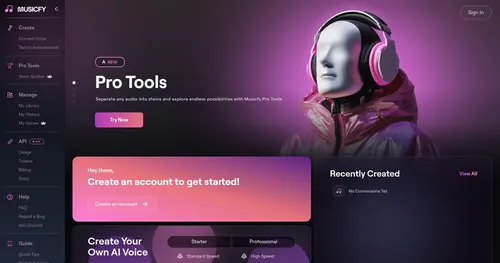LMNT
LMNT is an AI text to speech platform that generates lifelike audio from text inputs with ultra low latency of 150 to 200 milliseconds. It supports voice cloning from five second recordings and covers 24 languages including Arabic, English, French, Hindi, and Chinese.
The tool integrates via API with Python and Node SDKs for applications in conversational agents, games, and educational content. Trusted clients include Khan Academy for tutoring voices and HeyGen for video dubbing. Key features encompass streaming output without rate limits and scalability through enterprise plans.
Compared to ElevenLabs, LMNT offers lower latency but fewer preset voices, while Play.HT provides broader multilingual options at similar affordability. Pricing follows a volume based model with discounts for high usage, generally more economical than competitors for streaming needs. Users appreciate the natural prosody and ease of cloning, though some note limited emotional controls in presets.
The API spec includes endpoints for synthesis and cloning, requiring API keys for authentication. SOC 2 Type II compliance ensures data security for professional deployments. Integration examples cover Rust apps for news reading and Unity assets for game characters. Recent updates focus on model improvements like lmnt tts 0216 for better expressiveness.
For developers, the playground allows free testing of voices such as brandon or ava. Voice switching mid sentence maintains fluency across languages. Limitations include dependency on clean source audio for clones and smaller voice library versus rivals like Respeecher. Deployment suits real time scenarios over batch processing. Start by obtaining an API key and testing short texts in the docs provided playground.
Video Overview ▶️
What are the key features? ⭐
- Voice Cloning: Creates studio quality replicas from five second audio clips for personalized speech output.
- Multilingual Support: Handles 24 languages with seamless mid sentence switches for global applications.
- Low Latency Streaming: Delivers audio in 150 to 200ms ideal for real time conversational tools.
- API Integration: Provides Python and Node SDKs for quick embedding in apps and games.
- Scalable Pricing: Offers volume discounts and no rate limits for growing enterprise needs.
Who is it for? 🤔
Examples of what you can use it for 💭
- Game Developer: Integrates low latency voices into Unity for dynamic NPC dialogues that respond instantly.
- Educator: Clones instructor voices for Khan Academy style lessons in multiple languages with natural flow.
- Video Creator: Dubs scripts in HeyGen using custom clones that sync perfectly with avatars.
- App Builder: Powers conversational AI agents with streaming speech that handles interruptions smoothly.
- Podcaster: Generates episode narrations from text with emotive tones cloned from personal recordings.
Pros & Cons ⚖️
- Ultra low latency
- Affordable scaling
- Easy voice cloning
- Multilingual fluency
- Limited presets
- API docs gaps
FAQs 💬
Related tools ↙️
-
 Voiceflow
An AI agent building platform for teams to design, develop, and launch chat and voice assistants
Voiceflow
An AI agent building platform for teams to design, develop, and launch chat and voice assistants
-
Vapi Builds and deploys AI voice agents for real-time conversations
-
Jellypod Turns text into AI-generated podcasts with customizable hosts and global distribution
-
 Musicfy
Create an AI clone of your voice or explore other voices and use them for your songs
Musicfy
Create an AI clone of your voice or explore other voices and use them for your songs
-
 Abridge
A cutting-edge tool that turns doctor-patient talks into clear, organized notes in real-time
Abridge
A cutting-edge tool that turns doctor-patient talks into clear, organized notes in real-time
-
Outset Conducts AI-moderated interviews to deliver deep qualitative insights at survey speed

